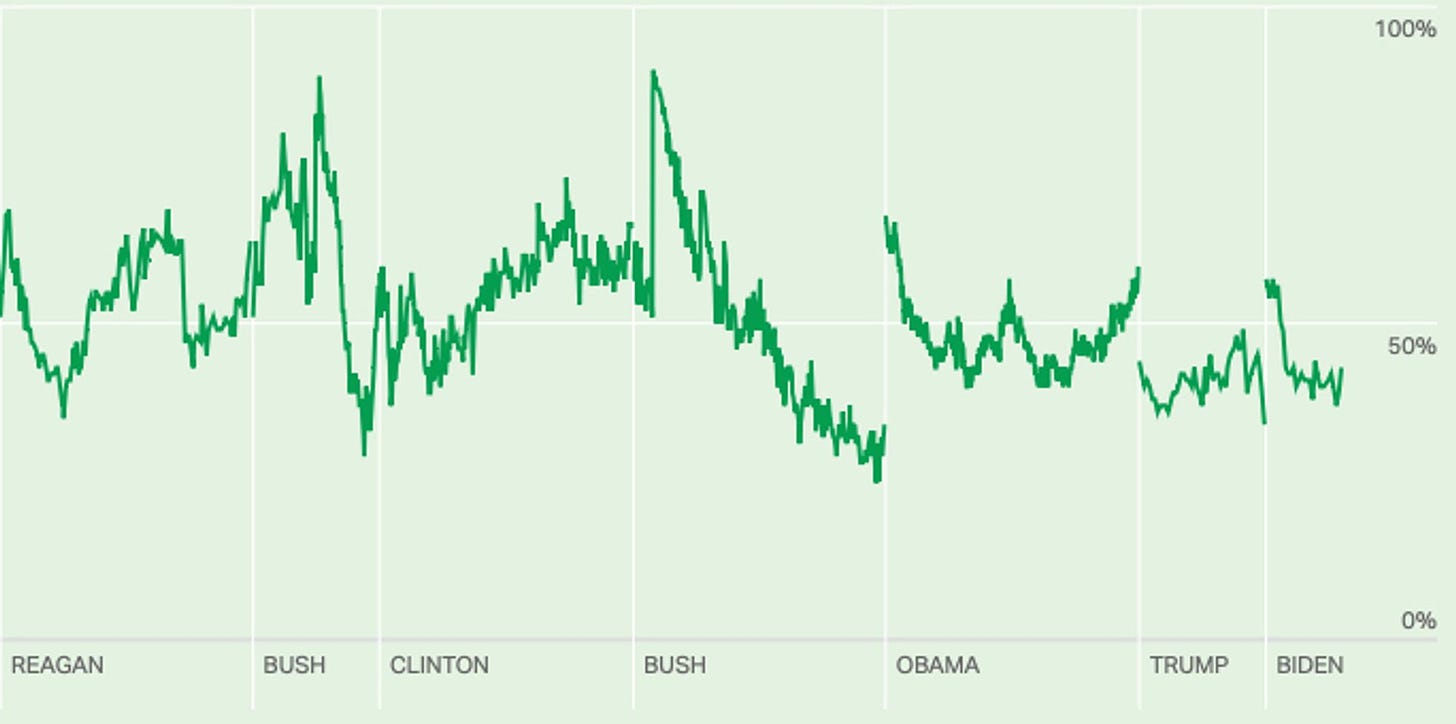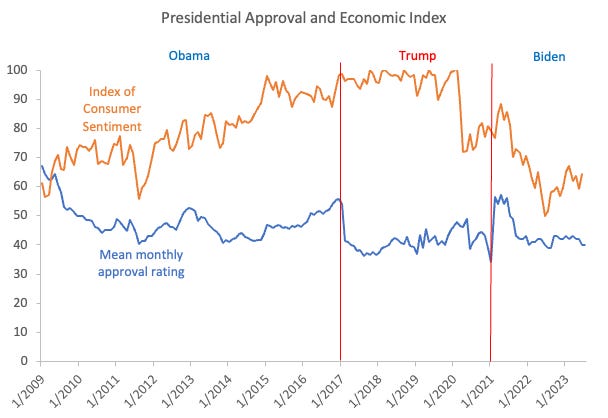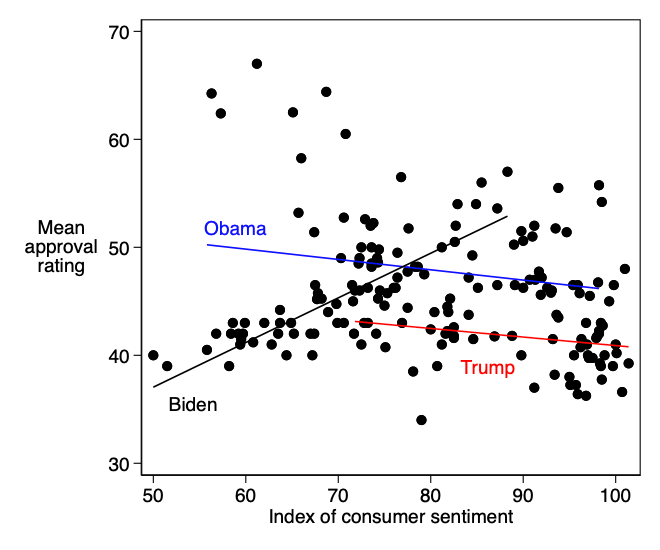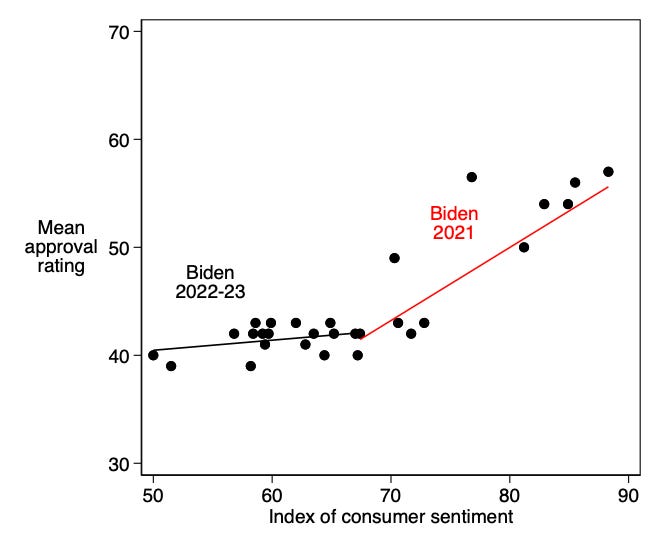Is it still the economy, stupid?
Biden isn't benefiting from a good economy because presidential approval doesn't really change much anymore
There’s been some interesting commentary recently about just why Joe Biden’s approval rating remain mired in the low 40s in a period of low unemployment, modest inflation, and solid economic growth. (See Dan Drezner, Jonathan Bernstein, and Noah Berlatsky for a recent sampling.) I’d like to weigh in here with what I think is going on. Presidential approval is largely untethered from economic growth these days, and a big part of that is that presidential approval doesn’t really change much anymore.
Just to get a big picture view of this, here’s the Gallup approval ratings for the past seven presidents. One thing that’s pretty obvious to the eye is that there was a lot more movement in the first four presidents (Reagan through W) than in the most recent three. The Bushes were kind of record-breakers, with highs near 90 (both associated with wars) and lows associated with economic recessions. But Reagan and Clinton both saw a lot of movement.
By contrast, Obama entered office with strong approval ratings, but they fell below 60 his first year in office, and no president has broken that barrier since then. Nor has any president dropped below 35 (except for Trump, who hit 34 his last month in office), while both Bushes fell into the 20s. Joe Biden came into office with approval ratings in the 50s, but those dropped following the Afghanistan withdrawal and have remained in the low 40s ever since. For the most part, the last three presidents have just had approval ratings in the 40s.
Now, we know from lots of studies that presidential approval is closely tied to the performance of the economy. John Sides and Robert Giffin describe the research on that and note a very strong correlation between economic performance and approval during the presidencies of John Kennedy (1961-63) through George W. Bush (2001-09). Except that hasn’t borne out too well for the past three presidents. The chart below shows monthly presidential approval and the University of Michigan’s Index of Consumer Sentiment, considered a reliable indicator of impressions of economic performance, since 2009.
Those don’t look particularly related. There was a bit of reverse relationship early in Obama’s presidency, as he came into office very popular while the economy was in crisis, but became less popular as the economy recovered. The economic index was at its highest points during Trump’s first three years in office, but this did not benefit him much. Nor did Trump’s approval ratings shift much when Covid sent the economy into a brief but terrifying tailspin.
Now, interestingly, there was some relationship between the economy and approval ratings during Biden’s first year in office; both moved downward over the course of that year. But in 2022 and 2023, there actually has been some recovery of economic sentiments that hasn’t really helped Biden.
Here’s another way of looking at this, based on the analysis Sides and Griffin did. The graph below is a scatterplot of the economic index (the horizontal axis) predicting presidential approval (the vertical axis) since January of 2009. Each dot represents a month of data. We see trendlines there for Presidents Obama, Trump, and Biden. Notably, as Sides and Griffin found, the trendlines for Obama and Trump are basically flat and even slightly negative — a good economy didn’t help their approval ratings. However, we do see a positive relationship for Biden, suggesting that maybe whatever was messing things up for Obama and Trump only pertained to them.
However, Sides and Griffin did their analysis a year ago. Look what happens if we separate out Biden’s first year in office from the time since then. His approval rating has been flat, even while impressions of the economy have shifted:
There are a few ways to think about this. One is that, thanks to growing polarization, there just isn’t that much movement in presidential approval anymore. Pretty much every Democratic (or Democratic-leaning independent) will say they approve of Biden, and pretty much every Republican (or Republican-leaning independent) will say they disapprove, and there just aren’t that many independents left to change their mind.
Relatedly, Democrats and Republicans live in increasingly divergent news environments. Viewers of Fox News pretty much never hear anything positive about Biden, and they’ve heard some critical coverage of Trump but far less than viewers of CNN or MSNBC have heard.
Notably, this doesn’t mean that views of the economy have completely polarized to the point of rigidity; there’s plenty of movement of the economic needle here. But if the economic news is good (as it has been lately), Fox News viewers mostly won’t hear about it, while if it’s bad, Fox will hit on it hard.
Here’s another thought: the Fed (and even Congress) have gotten pretty good at managing the economy. That is, we haven’t seen a sustained and pronounced recession since 2008. Nor have we seen an overheated boom, arguably since the 1990s. Even during Covid, the shutdown was very brief, it was quickly followed by a useful economic stimulus, and sustained economic growth returned pretty rapidly. It’s possible that extreme economic conditions could produce extreme shifts in approval, but we (luckily) haven’t seen those lately.
So does this mean that the economy is no longer driving elections? I don’t think that’s the case, but it’s possible that the effect is substantially muted. Notably, as with presidential approval, election results just don’t vary that much anymore. Here’s the popular vote share earned by the past six Republican presidential nominees:
Bush 2000 - 47.9
Bush 2004 - 50.7
McCain 2008 - 45.6
Romney 2012 - 47.2
Trump 2016 - 45.9
Trump 2020 - 46.8
That’s a pretty narrow range! We’re a very long way away from Reagan’s 18-point landslide in 1984 or Nixon’s 23-point landslide in 1972. Landslides just don’t happen at the presidential level anymore.
That said, some basic precepts still hold:
Incumbents usually win reelection.
When incumbents lose, it’s because the economy is in crisis.
The incumbent party usually loses when running for a third term.
These describe the bulk of elections since World War II and still seem to hold even in the twenty-first century, even if the margins are a lot smaller. Of course, there are tons of caveats, especially that those rules fall apart if you focus on the popular vote. (Both Al Gore and Hillary Clinton won pluralities of the vote when their party was seeking a third term.)
All this is to say that if we get a Biden-Trump rematch and the economy next year is behaving like it is this year, that probably means a Biden win. But it also seems safe to say that it will be close, that Trump will probably get around 46 or 47 percent of the vote again, and a lot will hinge on just where those votes are located. And people can come up with all sorts of theories for why Biden’s approval ratings aren’t higher, but chances are pretty much anyone in the White House would have similar approval ratings today.
Note: Thanks to John Sides for catching an errant data point in the Biden scatterplot. I have updated it.









My impression is that a lot of this is the increasingly common perception that the vote would make a meaning difference in economic matters. Young voters, for example, overwhelmingly voted for Biden... and are also the voters most concerned about, say, rising housing prices. But why the hell would they vote for Trump then? If one thinks Trump is the "I will bring housing prices down" candidate, I do not know what they have been reading. Social issues have increasingly been centered--especially post Dobbs--and it is my impression that most voters consider economic matters overwhelmingly secondary. Which is frustrating because, even if the economy is strong, affordability issues do persist.
I've been wondering if it should be, "It's the Democracy, stupid."?